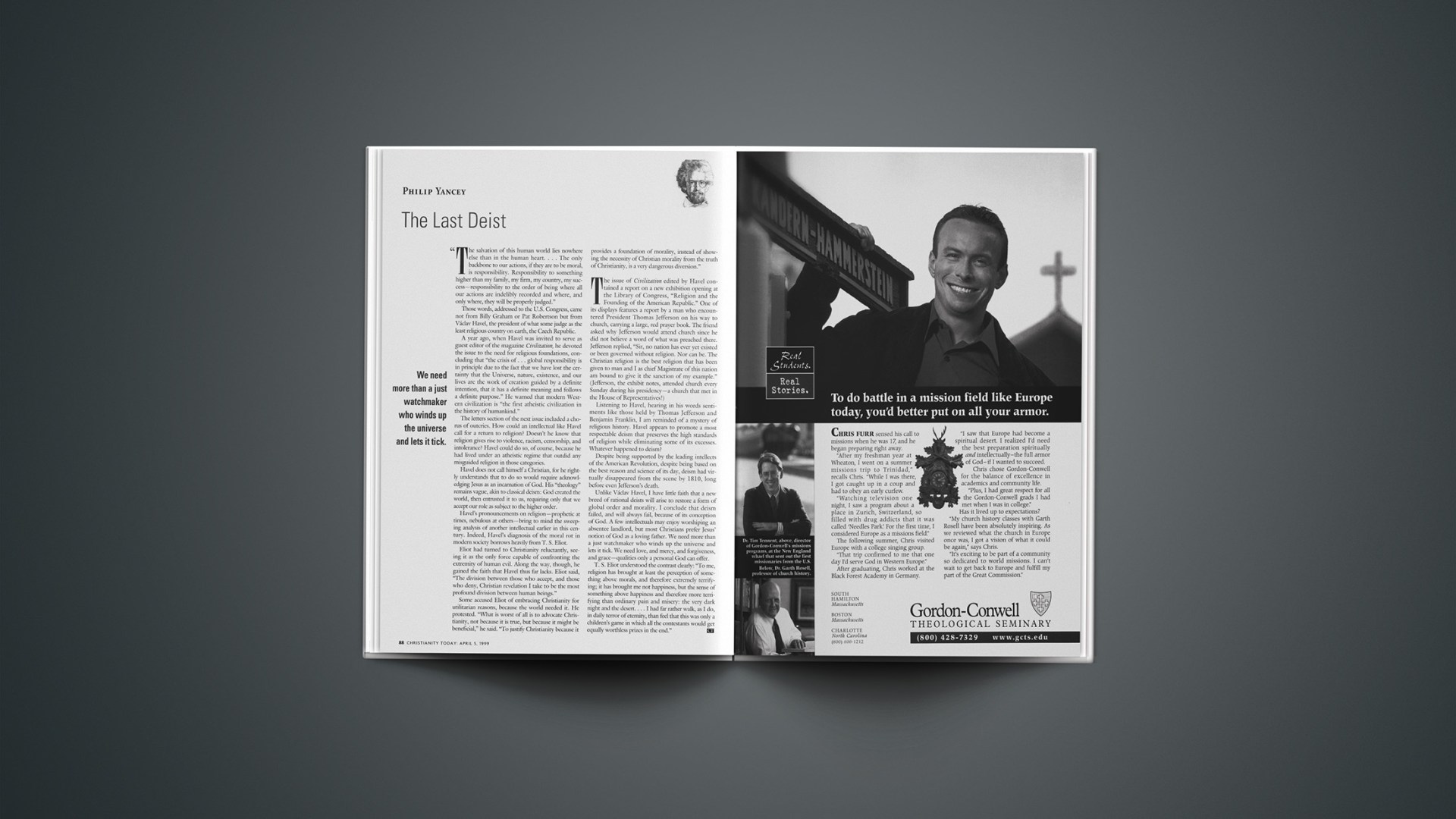“The salvation of this human world lies nowhere else than in the human heart . …The only backbone to our actions, if they are to be moral, is responsibility. Responsibility to something higher than my family, my firm, my country, my success—responsibility to the order of being where all our actions are indelibly recorded and where, and only where, they will be properly judged.”
Those words, addressed to the U.S. Congress, came not from Billy Graham or Pat Robertson but from Vclav Havel, the president of what some judge as the least religious country on earth, the Czech Republic.
A year ago, when Havel was invited to serve as guest editor of the magazine Civilization, he devoted the issue to the need for religious foundations, concluding that “the crisis of … global responsibility is in principle due to the fact that we have lost the certainty that the Universe, nature, existence, and our lives are the work of creation guided by a definite intention, that it has a definite meaning and follows a definite purpose.” He warned that modern Western civilization is “the first atheistic civilization in the history of humankind.”
The letters section of the next issue included a chorus of outcries. How could an intellectual like Havel call for a return to religion? Doesn’t he know that religion gives rise to violence, racism, censorship, and intolerance? Havel could do so, of course, because he had lived under an atheistic regime that outdid any misguided religion in those categories.
Havel does not call himself a Christian, for he rightly understands that to do so would require acknowledging Jesus as an incarnation of God. His “theology” remains vague, akin to classical deism: God created the world, then entrusted it to us, requiring only that we accept our role as subject to the higher order.
Havel’s pronouncements on religion—prophetic at times, nebulous at others—bring to mind the sweeping analysis of another intellectual earlier in this century. Indeed, Havel’s diagnosis of the moral rot in modern society borrows heavily from T. S. Eliot.
Eliot had turned to Christianity reluctantly, seeing it as the only force capable of confronting the extremity of human evil. Along the way, though, he gained the faith that Havel thus far lacks. Eliot said, “The division between those who accept, and those who deny, Christian revelation I take to be the most profound division between human beings.”
Some accused Eliot of embracing Christianity for utilitarian reasons, because the world needed it. He protested. “What is worst of all is to advocate Christianity, not because it is true, but because it might be beneficial,” he said. “To justify Christianity because it provides a foundation of morality, instead of showing the necessity of Christian morality from the truth of Christianity, is a very dangerous diversion.”
The issue of Civilization edited by Havel contained a report on a new exhibition opening at the Library of Congress, “Religion and the Founding of the American Republic.” One of its displays features a report by a man who encountered President Thomas Jefferson on his way to church, carrying a large, red prayer book. The friend asked why Jefferson would attend church since he did not believe a word of what was preached there. Jefferson replied, “Sir, no nation has ever yet existed or been governed without religion. Nor can be. The Christian religion is the best religion that has been given to man and I as chief Magistrate of this nation am bound to give it the sanction of my example.” (Jefferson, the exhibit notes, attended church every Sunday during his presidency—a church that met in the House of Representatives!)
Listening to Havel, hearing in his words sentiments like those held by Thomas Jefferson and Benjamin Franklin, I am reminded of a mystery of religious history. Havel appears to promote a most respectable deism that preserves the high standards of religion while eliminating some of its excesses. Whatever happened to deism?
Despite being supported by the leading intellects of the American Revolution, despite being based on the best reason and science of its day, deism had virtually disappeared from the scene by 1810, long before even Jefferson’s death.
Unlike Vaclav Havel, I have little faith that a new breed of rational deists will arise to restore a form of global order and morality. I conclude that deism failed, and will always fail, because of its conception of God. A few intellectuals may enjoy worshiping an absentee landlord, but most Christians prefer Jesus’ notion of God as a loving father. We need more than a just watchmaker who winds up the universe and lets it tick. We need love, and mercy, and forgiveness, and grace—qualities only a personal God can offer.
T. S. Eliot understood the contrast clearly: “To me, religion has brought at least the perception of something above morals, and therefore extremely terrifying; it has brought me not happiness, but the sense of something above happiness and therefore more terrifying than ordinary pain and misery: the very dark night and the desert. … I had far rather walk, as I do, in daily terror of eternity, than feel that this was only a children’s game in which all the contestants would get equally worthless prizes in the end.”
Copyright © 1999 Christianity Today. Click for reprint information.










